The shop will be closed for the next few days due to the snowstorm in the Northeast. All orders will be shipped promptly once we can reopen. Thank you for your patience!
Sacs & Seals -- Pencil Lead -- Nibs -- Other Parts -- Accessories
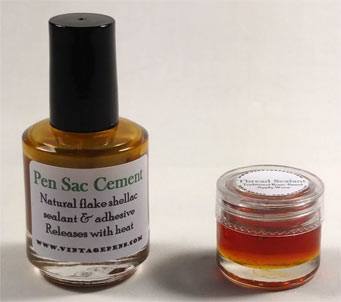
Premium quality pen sac cement and general purpose sealant, hand-mixed in our shop in small batches using natural flake shellac for maximum freshness and working life. Nontoxic, prepared with food-grade ethanol, no additives or denaturants, 100% methanol-free. Softens with heat, best choice for latex and PVC sacs (use silicone adhesive for silicone sacs). Compatible with all standard pen materials, vintage and modern. Tip-resistant 1/2 ounce (15 ml) glass jar with built-in flat profile brush applicator, $6.50
Standard quality pen sac cement, traditional formula of shellac dissolved in ethanol (drinking alcohol) with added isopropanol (rubbing alcohol). Same packaging and applications as our premium cement, $4.50
Thread sealant, rosin-based, thick and sticky at room temperature, apply warm. Will hold threaded joints firm and ink-tight, releases readily for disassembly when gently heated. Typical uses include Vacumatic, piston-filler, and plunger-filler section joints. All natural, non-toxic, no petrochemicals. 5 ml will last a long time: $8

Pure laboratory grade talc, no added oils or perfumes. Apply thinly with brush or wiper to pen sacs and diaphragms. Prevents sticking, eases installation, protects both the sac and the pen barrel from chemical reaction.
8.35 cm (3.3 inch) tube, $2.50
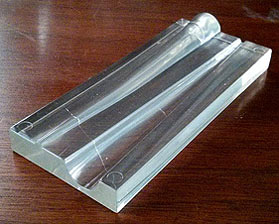
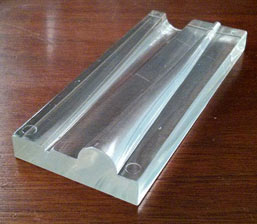
A nib block is an essential tool for straightening nibs that are sprung or otherwise damaged. Vintage examples are nearly impossible to find, however, and the modern tool steel blocks that have been lovingly machined and hand-finished cost hundreds of dollars, if you can get in on a one of their limited production runs. Some years ago, we bought a group of old nib blocks from a long-established pen repair service in England. Most were tool steel in various shapes, but a couple were made of acrylic. Though they had some superficial scuffing and scratches from decades of hard use, they were still as good as ever, which inspired us to use the same material for a new run of nib blocks, affordable for every pen hobbyist.

In many respects, acrylic is an ideal material for a nib block. While in some cases a completely unyielding metal surface is to be preferred, more often the slightest degree of "give" is better when bent metal is to be counter-bent to restore it to straightness (we often put a strip of thin paper over our steel nib blocks for just this reason). We have decided not to sell straightening tools for use with these blocks, given that they are widely available at very modest cost from other sellers. For around $5 one can purchase a burnisher as used by jewelers and engravers, or a set of dapping punches with polished rounded steel heads. Making one's own tools is another option: we have several made from cheap screwdrivers that have been cut short, ground round, and polished smooth.
Our new blocks measure 11.5 cm x 5 cm (4.5 x 2 inches), with diameters on both convex and concave surfaces running from 3 to 15 mm (1/8" to 19/32") -- a range that should accommodate nibs of all sizes, from the smallest miniatures to oversize dip pen nibs. Note that these blocks are cast, not machined, and that the convex ridge has a saddleback curve in the middle rather than being dead straight across the top.
$25 each (photos above show the block from each side)
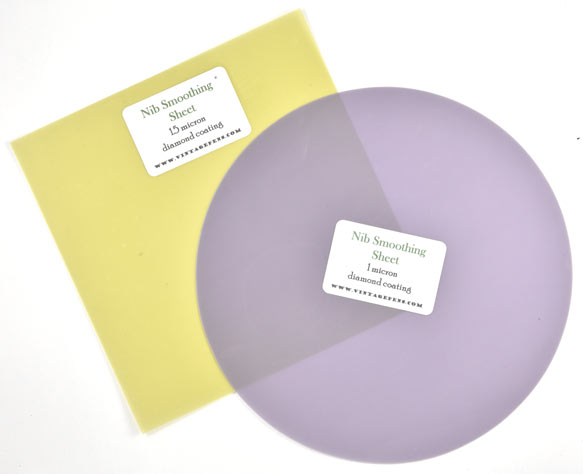
These mylar-backed nib smoothing sheets aren't cheap, but they are the best! Do not confuse them with cheaper mylar abrasives coated with aluminum or chromium oxide. The industrial diamond coating on these is far superior, and strongly resists being scraped off the mylar backing -- so much so, that one can run the edges of these sheets between a nib's tines to smooth the inside edges of the tipping material. Can be used wet or dry, will outlast other polishing media many times over. Each sheet measures either 4.25 x 4.25 inches (10.8 x 10.8 cm) or 5 inches (12.7 cm) in diameter, and will be good for smoothing dozens of nibs.
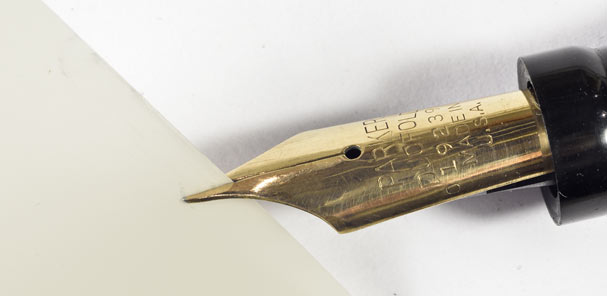
Available with particle size of 1.0 micron (very fine, for finish work or slow deburring) or 1.5 micron (fine, offers faster deburring). $6 per sheet.
We have a limited number of 0.5 micron disks, 5 inches (12.7 cm) in diameter (6 mm) central hole, available at the same price while supplies last.
Please note that these are much finer than mylar-backed abrasives sold for hobby use, while the grit size is far more closely controlled. This chart gives conversions between different abrasive scales, listing abrasives of 0.5 micron as equivalent to 60,000 grit (the finest Micro-Mesh offers is 12,000 grit), 1.0 micron as equivalent to 14,000, and 1.5 micron as equivalent to 13,000.
Click here for more information on nib smoothing techniques
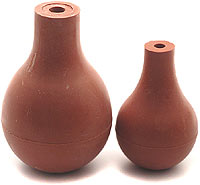
Cleanout bulbs are essential for pen restoration and maintenance: use them to flush out accumulated ink deposits and sediments from sections, feeds, and nibs, or to clean out dried ink from Parker 61 capillary reservoir units. Similar bulbs were furnished by Waterman for routine cleaning of their eyedropper-filling pens at the beginning of the 20th century. Cheaper, less risky, and often more effective than an ultrasonic cleaner! These sturdy, thick-walled rubber bulbs will last for years. The large bulbs will fit the section nipples of most pens, as well as Parker 51 and 61 nib openings. The small bulbs are now out of stock. $4.95 each.
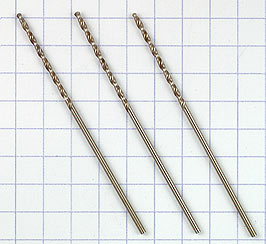
Precision drill bits for mechanical pencil repair. Easily 90% of old mechanical pencils that don't work are only jammed. Nothing is wrong with their mechanisms, but lead is stuck inside. Sometimes it's just a single piece of lead that won't budge, sometimes a piece has broken inside, fragments jamming the mechanism. Clearing out the jammed lead requires a drill bit of just the right size. Too small, and a tube of lead remains which has to be broken up and coaxed out with a sharp pick. Too large, and metal is removed from the nozzle, leaving the fit of the lead in the pencil sloppy and loose.
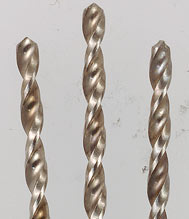
These special-order twist bits are available in two sizes, carefully dimensioned for optimal fit in mechanical pencils that use .9 mm (.036 inch) and 1.1 mm lead (.046 inch). Only a few hundredths of a millimeter (thousandths of an inch) smaller than the lead they are designed to clear, they have extra-sharply twisted spiral flutes which extract pencil lead residue far more effectively than the nearly-straight flutes found on standard drills.
Drill bits are top quality USA production, $9 for three.
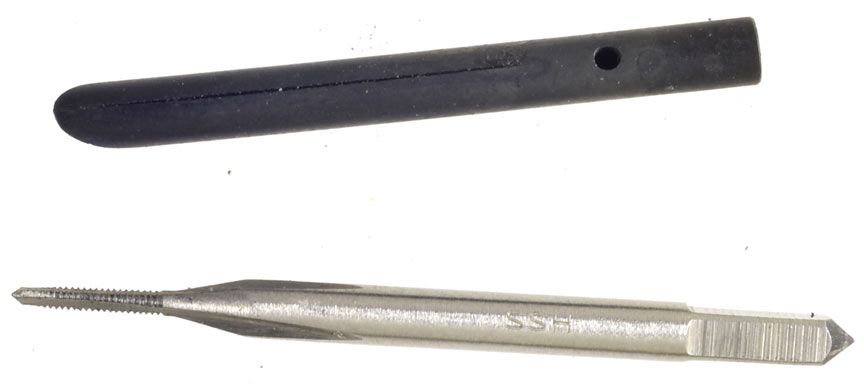
Extractor for broken Parker 51 Aerometric silver breather tubes. Often these tubes corrode and break off, leaving a stub stuck inside the end of the feed preventing installation of a new tube. To use, thread the extractor into the end of the broken tube, heat the hard rubber feed until it softens, then pull gently. Do not rock side to side to avoid breakage. $6.95 each
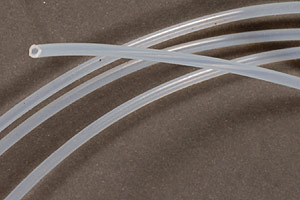
Special thin-wall Teflon tubing will not corrode, low-friction surfaces resist ink residue buildup. Approximately .064" (1.6 mm) OD, cut to length to make replacement breather tubes for Vac-filling Parker 51s and later 51s with plastic breather tubes, Parker Vacumatics, Eversharp Skylines, and many other pens. 18 inches (~ 46 cm) for $6.
NOTE: for Parker 51 Aerometrics that use a long thin metal tube, replacements are listed here. We also sell original celluloid breather tubes for Parker 51s and Vacumatics here
Sacs & Seals -- Pencil Lead -- Nibs -- Other Parts -- Accessories